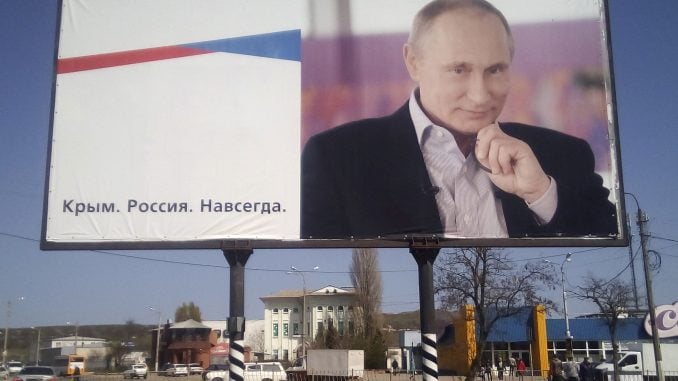
Russia’s meddling in the U.S. presidential campaign was unprecedented in American history. Whether or not Moscow’s intervention helped Republican Donald Trump win the White House remains unclear. Nevertheless, Trump’s victory and the Kremlin’s enthusiasm for it offers proof that the post-World War II era is over and that millions of U.S. voters support a broader international retreat from global integration.
Trump and Russian President Vladimir Putin agreed to work toward “constructive cooperation” in a phone conversation on Monday. But although the two leaders are not due to meet before the January inauguration of the U.S. president-elect, that doesn’t mean Moscow will scale back its political machinations before then. The immediate effect of the Trump win has been to validate Russia’s almost certain hacking of Democratic Party leaders’ email accounts. So, too, Putin’s slaughter in Syria, where the overarching aim of his bombing campaign against the rebels opposing President Bashar al-Assad is to thwart a solution to one of the most pressing crises facing the West. The Kremlin is also backing the ongoing killing in eastern Ukraine and financing right-wing groups across Europe with the same aim of sapping Western unity and resolve. Now Trump’s election will embolden Moscow to step up such efforts to insert itself into global affairs, which boost Putin’s authoritarian control at home by enabling him to portray himself as a restorer of Russian greatness.
Delivering that message to the country, the Kremlin’s vast propaganda machine boosts the Russian president’s popularity by creating an alternate reality in which actions that are isolating Russia and crippling its long-term development are portrayed as heroic, and all deleterious effects blamed on Western enemies. Undermining Putin’s narrative by resisting his bullying and ultimately helping expose his actions as catastrophic for Russians is the surest way of countering him. As a former secretary of state who did not shy away from confronting Putin after the failure of President Barack Obama’s Russia reset policy, Hillary Clinton would have been as well placed as any American politician to deal with the challenge.
Trump has done the opposite, of course, reinforcing the mythologizing of Putin with his praise of the former KGB officer as a strong leader. The U.S. president-elect has enjoyed similar success casting himself as a champion of common people no mean achievement for a hate-mongerer accused of groping women. The two men, both pursuing their ultimate ends of personal power and enrichment at the expense of the ordinary people, are natural allies. When it comes to foreign policy, “it is phenomenal how they got to be so close in their conceptual approaches,” Putin’s spokesman crowed after the Republican’s election. Their views will surely diverge and the bonhomie evaporate once Trump assumes control of Russia’s designated main enemy, as they did under former President George W. Bush, that notorious glimpser of Putin’s soul. For now, however, Trump and Putin share a common interest in the global march from integration and democratization toward nationalism and authoritarianism.
Moscow represents merely one threat to the trans-Atlantic order. Unlike Russia which lashes out from weakness China is deeply invested in the U.S. economy. But its anti-American rhetoric and actions in the South China Sea aim to chip away at America’s security bulwark. Brexit poses an even greater danger by striking a body blow to the European Union, Washington’s most important strategic ally. And with rising authoritarianism in Hungary and Poland further weakening the unity of a continent on which Washington relies to further its interests and values, the decline of Pax Americana, not just the United States, suddenly appears to be a very real possibility.
It’s not clear what Trump’s foreign policy will look like. The reality TV star with no apparent fixed ideology or governing experience has issued promises chiefly for their popularity with his base. Still, with bombasts like the hardliner John Bolton George W. Bush’s ambassador to the United Nations on his shortlist for secretary of state, Washington appears poised to resume its burning of European alliances. Trump has already rocked the Western security establishment by indicating U.S. military support for NATO would depend on member countries’ payments to the defense organization, the cornerstone of global security since World War Two. Ditto for South Korea and Japan in the Pacific.
Some Trump critics believe the United States may emerge from his presidency largely unscathed thanks to the strength of its civil society and limits on a Republican Congress and White House in a Constitution designed to resist the tyranny of the majority. Indeed, America’s moral standing has withstood the likes of McCarthyism, the Vietnam War and other Cold War-era catastrophes. But no modern U.S. president has signaled Trump’s level of contempt for our most basic democratic institutions and ideals.
It remains to be seen whether he ultimately goes along with Putin’s insistence on a return to a 19th-century international order of spheres of influence that would curtail the threat of democratic reform in Russia and its neighbors abandoning Ukrainians and other Eastern Europeans to Moscow’s dominion once again. Such renunciation of Washington’s role as the unrivaled power in global affairs will surely be Putin’s price for maintaining his bromance with Trump.
From the Roman Empire’s decline to the Ottoman’s, history is replete with examples that appeared improbable before they happened. Although America’s decline is not inevitable, future historians may look back on the election of the billionaire who promised to make America great again as a bookend to an extraordinary 20th-century era of leadership launched after the great European empires emasculated themselves in two wars also fueled by nationalism, xenophobia and sweeping promises to societies rocked by major economic transformation. But whatever happens during the next four years, Trump’s election has already fundamentally changed the geopolitical landscape.Gregory Feifer is the author of “Russians: The Power Behind the People.” The opinions expressed here are his own.



